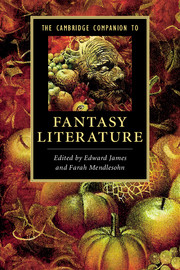4 - The development of children's fantasy
from PART I - HISTORIES
Published online by Cambridge University Press: 28 March 2012
Summary
Fantasy for children, similar to children's literature at large, could not emerge until childhood was acknowledged as a separate and especially formative period in human life. However, while the Enlightenment primarily resulted in instructive works for young readers, Romanticism, with its interest for, on the one hand, folklore, and on the other, the child as innocent and untouched by civilization, provided rich soil for the first fantasy stories explicitly published for children, naturally children of the upper and middle classes. In handbooks of children's literature, fantasy is frequently treated together with literary fairy tales, or under the misleading label ‘modern fairy tales’.
E. T. A. Hoffmann's ‘The Nutcracker and the Mouse King’ (1816) is internationally acknowledged as the first fantasy explicitly addressed to children, since the protagonist is a little girl, the point of departure is the nursery, and many characters are toys. The child is, however, instrumental in the story, which rather involves the animated toy, the Nutcracker, and his quest for the princess in the fairy land. The connection between the Nutcracker, an enchanted prince, and the enigmatic old man in the real world is hinted at. Yet play and playfulness, associated with childhood, make this story different from Hoffmann's other fantastic stories, even though it carries many philosophical and ethical aspects far beyond a child's comprehension. Similarly, Carlo Collodi's The Adventures of Pinocchio (1881), with its puppet as the central character, has always been considered a story for children, despite its narrative and moral complexity.
- Type
- Chapter
- Information
- The Cambridge Companion to Fantasy Literature , pp. 50 - 61Publisher: Cambridge University PressPrint publication year: 2012
- 6
- Cited by



